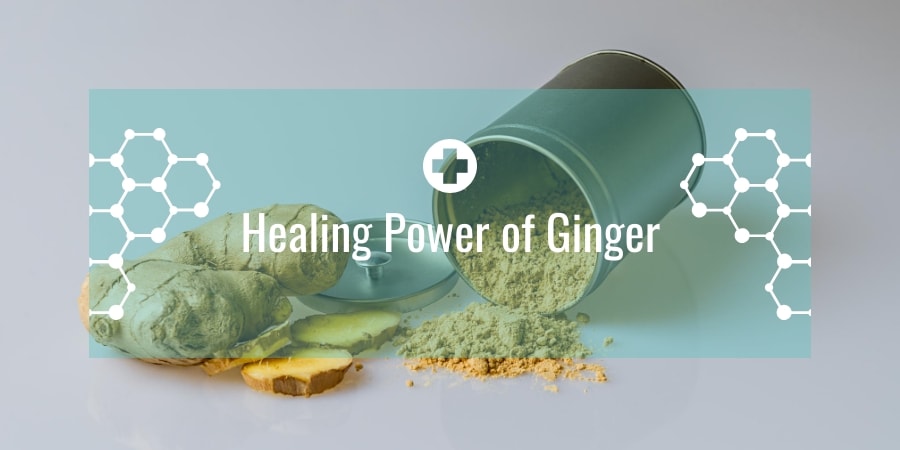Ginger is used widely as a versatile spice and condiment in many recipes – from curries to stir-fries, pickled ginger to gingerbread. This popular plant is also famous for its benefits in traditional and complementary medicine.
Ginger (Zingiber officinale), which is said to be a native of Asia, is one of the most widely used species of the ginger family (Zingiberaceae). The rhizome is used worldwide as an aromatic carminative and pungent appetite stimulant, and is a common condiment for various foods and beverages. Its widespread use is not only due to its flavor, but to the antioxidant and anti-microbial effects, which is necessary for preservation of food.
Ginger is commonly used as a home remedy for conditions like such as headaches, nausea, rheumatism, and colds. Many herbalists use ginger in the treatment of the common cold and cough, as it acts as an expectorant. Ginger can be takes as infusions, decoctions and in powder form. As a gargle, it may be effective in the relief of sore throats.
For external uses, is the best of many fibrositis and muscle sprain treatment. Topically, the fresh juice of ginger is used for treating thermal burns. The essential oil of ginger is used topically as an analgesic.
Ginger also has a significance presence as a food supplement in naturopathy, as well as, complementary medicine. Ginger is known for the following therapeutic actions:
- Helps to lower cholesterol
- Reduces the risk of heart disease by inhibiting platelet aggregation
- Calms an upset stomach due to indigestion and flatulence
- Boosts metabolism
- Contains anti-inflammatory properties
- Relieves morning and motion sickness
A circulation herb, ginger may be used as a stimulant of the peripheral circulation in cases of bad circulation, chilblains and cramps. It is noteworthy that ginger is said to support the cardiovascular system by inhibiting synthesis of substances associated with platelet aggregation.
Ginger is also believed to rid the body of toxins. It is used in dozens of traditional Chinese prescriptions as a ‘guide drug’ to ‘mediate’ the effects of potentially toxic ingredients.
Wide uses of ginger in Traditional Chinese Medicine
In Traditional Chinese Medicine, ginger is characterized as having a pungent flavor, and is claimed to warm the body and treat cold extremities by inducing perspiration and promoting circulation of vital energy (qi) and blood. Hence, ginger is said to improve a weak and tardy pulse, address a pale complexion, and strengthen the body after blood loss.
To a Traditional Chinese Medicine physician, ginger has the following functions:
- to warm the spleen and stomach, and dispel cold
- to prevent yang from collapsing
- to warm the lungs and resolve phlegm-damp
Ginger, also known as Sheng Jiang, is also used for colic, dyspepsia, loss of appetite, post-surgical nausea and vomiting, migraine headache, anorexia, upper respiratory tract infections, cough, bronchitis, and as a galactagogue, to excite lactation.
If you have been eating ginger, you’ll probably find yourself sweating. Ginger in general is very diaphoretic, which means it promotes perspiration. It makes secretions flow. Not just sweating from the skin, it also includes the flow of tears and sinuses. There are anecdotal reports of people curing themselves of sinus just by consuming ginger tea and rice porridge cooked with plenty of ginger, under the advice of a Chinese doctor.
Ginger plays an important role in the Chinese postnatal diet which is geared towards driving out the ‘wind’ in the body, promoting blood circulation and strengthening the joints. The Chinese use a lot of ginger during confinement. In China, women customarily drink a mixture of ginger cooked in wine and sesame oil shortly after giving birth.
Fresh or dried?
The rhizome is used fresh, as well as, dried. Some Chinese preparations call for fresh, some for dried. Fresh ginger is used orally for treating acute bacterial dysentery, baldness, malaria, orchitis (an inflammation of one or both of the testicles, often caused by infection), poisonous snake bites, rheumatism, and toothaches. Although fresh ginger possesses numerous therapeutic properties effective in the treatment of rheumatoid arthritis, the dried is recommended for anti-inflammatory conditions.
Dried ginger (Ganjiang) root has different effects from fresh ginger. When it is dried, there are some chemical changes and it has more of the anti-inflammatory type compounds. It is believed to work well for all auto-immune diseases. Ginger oils have been also used for thousands of years by the Chinese as anti-arthritic remedies.
Side effects of ginger are generally minimal if taken in the amounts used to flavour food. However, taking excessive amounts of ginger may cause mild heartburn. For those who have gallstones, taking ginger may worsen the condition as ginger promotes the flow of bile. Women who are pregnant or breastfeeding may also want to avoid taking excessive amounts of ginger.
